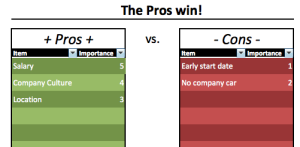 There’s a common discussion about the value of finding a personal mentor in your field. Some people say it’s so important to have a mentor that you should pay large amounts of money for them and their connections.
There’s a common discussion about the value of finding a personal mentor in your field. Some people say it’s so important to have a mentor that you should pay large amounts of money for them and their connections.
While I’m not sure about paying for mentors (and that might be called paying for a consultant), I am positive that mentors can provide instrumental value for your career.
Three Key Advantages Of Having A Mentor
The mentor-mentee relationship has many benefits for the teacher and student. However, I’m going to touch on three important advantages for the person being advised.
Experience
The first advantage that mentors can provide is years of experience. They will offer a wealth of information from their successes and failures that you simply cannot accumulate at your age.
Use their experience to help shape your future decisions. For example, Publius Syrius said, “It is good to learn what to avoid by studying the misfortunes of others,” and a Chinese Proverb goes, “If you would know the road ahead, ask someone who has traveled it.”
A mentor can also save you from making the wrong decision and wasting years of your life at a lost cause.
Knowledge
When beginning grad school, a new job, or anything else, a young person lacks the same knowledge that a successful person in that field has already acquired. That’s why mentors are unique because they can help bridge the gap in knowledge. Or, mentors are supportive in directing the student to other resources to find the technical information.
Inspiration
Mentors are often role models that the mentee can look upon for motivation. So, mentors can inspire the mentee’s effort to work through the difficult and painful process toward success, which is necessary to become elite. Consistent daily actions toward a goal are more powerful than hot and cold seasons of devotion.
Creative Approach To Finding A Mentor
Ideally, you know someone who is willing to be your mentor, and then you two can set up times to meet in person and define the expectations of your relationship. Yet, this isn’t always the case, especially as a college student or young professional.
If you can’t find a traditional mentor, that doesn’t mean you can’t find one in a different perspective. Contrary to common belief, you can find a mentor through books and the internet.
That’s right, I believe mentors are all around you. You just need to make the effort to hear them.
For example, if you’re going into finance, read Warren Buffett’s books. Then go even deeper and read Buffett’s mentor Benjamin Graham’s book The Intelligent Investor.
For another example, if you want to be a lifestyle entrepreneur, then read the blog posts and books by Tim Ferriss. Listen to Tim’s podcasts or watch his videos. There are thousands of other examples that suit your future field.
In the world of 2015, we have access to mentors like never before. It would be nearly impossible to get dinner with Warren Buffett or Tim Ferris and ask them questions. But, we can consume their resources and benefit from gaining their experience, knowledge, and inspiration. Then when we apply what we learned from their life to our life, we can truly achieve successful results.
Action Steps For You
If you can find a professional that will mentor you, then that’s awesome and you should continue to develop that relationship. Otherwise, take these action steps below to receive similar advantages.
- Locate books (buy them online or rent from the local library) or blog posts, find podcasts, view Tweets, and bookmark YouTube videos of the giants in your field.
- Spend fifteen minutes (or a couple of hours) each day reading, listening, or watching these resources.
- But, don’t only do those two steps. The most important part is to do the actions these successful people did and recommend.
- Evaluate if you accomplished anything, and why. If you were successful, continue. If you weren’t, change your approach.
When you look for the positive in a situation, like finding a mentor, your world opens up to new possibilities.
Readers: Are there other vital benefits to having a mentor? Who are the giants in your field that you can learn from? What are the best career-related books you’ve read?


